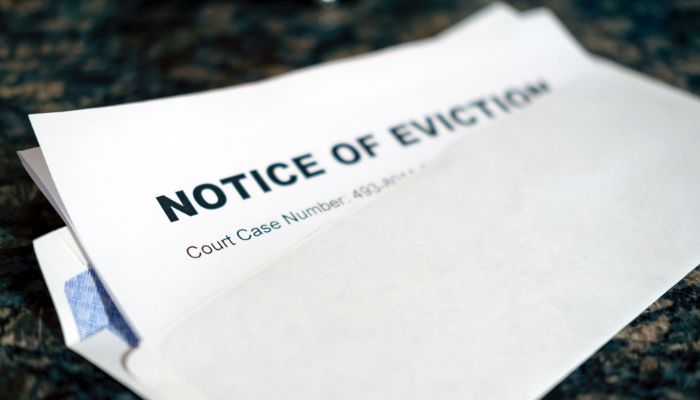
In New Hampshire, landlords are entitled to evict tenants under certain conditions such as non-payment of rent, violation of lease agreements, illegal activities, or significant property damage. The eviction process strictly requires landlords to provide written notice, stating a clear reason for eviction and allowing a set period for tenants to rectify the issue.
Non-compliance with these regulations may lead to legal ramifications for landlords. It’s crucial that landlords understand these privileges and constraints to mitigate potential conflicts. If you want to dig deeper, there’s a wealth of further information available on the exact processes and tenant defenses.
Understanding New Hampshire Eviction Laws
Delving into New Hampshire’s eviction laws, landlords must be aware of their legal rights and responsibilities to effectively manage their rental properties. Understanding New Hampshire landlord eviction rights is crucial in maintaining a successful landlord-tenant relationship.
A central aspect of these rights relates to eviction notices. In New Hampshire, landlords must adhere to specific notice requirements before evicting a tenant. A landlord cannot initiate an eviction process without first providing a written notice to the tenant. This notice must clearly state the reason for eviction, which, more often than not, is nonpayment of rent.
However, it is important for landlords to note that eviction cannot be used as a form of retaliation or discrimination against the tenant. The eviction notice must comply with the legal requirements set forth in New Hampshire’s landlord-tenant law.
Failure to meet these legal requirements can invalidate the eviction process, leading to potential legal ramifications for the landlord.
Nevada Landlord Eviction Rights: How Identingly Can Assist
Handling evictions in Nevada can be a challenging process due to the various legal requirements. At Identingly, we provide a range of services designed to help landlords navigate these challenges effectively. Here’s how we can assist:
1. Comprehensive Eviction Records
Identingly offers access to an extensive database of eviction records, including past evictions and court rulings. This allows landlords to review detailed histories and make informed decisions about potential tenants, ensuring they avoid those with problematic rental backgrounds.
2. Thorough Background Checks
Our background checks cover critical aspects such as credit history, criminal records, and rental history. These checks help landlords identify potential risks early on, ensuring they select reliable tenants and have the necessary documentation if an eviction becomes necessary.
3. Legal Compliance Guidance
Understanding and adhering to Nevada’s eviction laws can be complex. Identingly provides detailed guides and resources to help landlords stay compliant throughout the eviction process. From drafting the initial eviction notice to managing court proceedings, our step-by-step guidance ensures adherence to all legal requirements.
Identingly is committed to supporting Nevada landlords with the resources and expertise needed to manage evictions smoothly and legally. Our comprehensive services ensure that landlords can handle the eviction process with confidence and efficiency.
Grounds for Eviction in New Hampshire

Moving forward, it’s important to consider specific reasons that can legally justify a landlord’s decision to evict a tenant in New Hampshire. The grounds for eviction in this state are typically based on lease violations. These violations might include non-payment of rent, conducting illegal activities on the property, or breaching terms of the rental agreement, such as having unauthorized pets or causing significant property damage.
It’s crucial to understand that landlords must provide proper notice before eviction proceedings can begin. In most cases, a 30-day notice is required, allowing the tenant ample time to rectify the violation or vacate the premises. Failure to provide this notice can result in an unlawful eviction case, providing the tenant with possible legal recourse.
While the eviction process can be complex, understanding the permissible grounds for eviction in New Hampshire can ensure landlords operate within the law and protect their properties effectively.
Knowing these laws can also help tenants understand their rights and responsibilities, potentially preventing unnecessary eviction proceedings. This knowledge can contribute to a smoother, more respectful landlord-tenant relationship.
Tenant Notice Period in New Hampshire
In the state of New Hampshire, the notice period given to tenants before eviction plays a crucial role in maintaining legal compliance and fairness in the eviction process. The tenant notice period in New Hampshire is governed by specific laws, and landlords must adhere to these to ensure they are meeting their legal obligations.
The notice provision rules depend on the reason for eviction. For instance, nonpayment of rent requires a seven-day notice of eviction, while other lease violations necessitate a 30-day notice. These notice periods allow tenants ample time to remedy the situation or find alternative accommodations, ensuring they are not abruptly displaced.
The notice must clearly state the reason for eviction and the time period the tenant has to rectify the issue. This is a critical aspect of rental agreements in New Hampshire, and failure to comply can lead to legal complications for the landlord. Understanding Nevada landlord eviction timelines can offer a comparative perspective on how different states handle eviction notices.
New Hampshire Eviction Process Timeline

Understanding the timeline for the eviction process in New Hampshire is critical for landlords to ensure lawful proceedings. New Hampshire’s landlord-tenant laws lay out a clear timeline for evictions, starting with proper notice periods to vacate rental properties. Similarly, New Jersey eviction defense for landlords provide detailed guidelines that are essential for landlords in Nevada to follow.
The eviction process commences when a landlord provides their tenant with a written eviction notice. The notice periods vary depending on the legal grounds for eviction. For instance, non-payment of rent usually requires a seven-day notice, while violation of lease terms often requires a 30-day notice.
Following the notice period, if the tenant has not rectified the situation or vacated the premises, the landlord can file an eviction suit in court. The court serves the tenant with a summons to appear. If the court rules in favor of the landlord, it issues a “writ of possession.” The tenant must then leave the property.
Failure to adhere to this timeline might render an eviction unlawful and lead to penalties for the landlord. Therefore, understanding and following New Hampshire’s eviction process timeline is integral to maintaining the integrity of rental properties.
Legal Defenses for Tenants in New Hampshire
Tenants facing eviction in New Hampshire have several legal defenses at their disposal to challenge the eviction proceedings. These legal defenses protect tenants from unlawful eviction and ensure that landlords do not violate tenants’ rights.
- One common legal defense is if the landlord failed to properly serve the tenant a notice of default. New Hampshire law mandates that landlords provide tenants with a proper notice of default before proceeding with an eviction. If this notice is not served correctly, the eviction may be deemed unlawful.
- Another defense is related to rental history. If a tenant can prove that they have consistently paid rent on time and have not violated the terms of the lease agreement, this could potentially halt the eviction process.
- Lastly, retaliatory evictions are also considered unlawful in New Hampshire. This means that if a tenant believes their eviction is a result of them exercising their rights, such as reporting a health or safety violation, they can use this as a defense against eviction.
New Hampshire Landlord’s Rights After Eviction

After successfully executing an eviction, landlords in New Hampshire possess specific rights and responsibilities in relation to the vacated property. The lawful eviction process starts with a notice of intent and often ends with eviction for nonpayment. Once tenants are removed from the premises, this process provides certain protections for landlords.
One of the primary rights of New Hampshire landlords post-eviction is the ability to recoup lost rent and damages. This is often achieved through a court order, particularly if the eviction was due to nonpayment. The landlord may also have the right to retain the security deposit to cover any unpaid rent or damages caused by the tenant.
Landlords can re-rent the property as soon as it becomes vacant. They do not need to provide a 30-day written notice to the previous tenant. However, they must comply with local and state regulations to maintain healthy landlord-tenant relationships.
Lastly, landlords should remember to properly dispose of any personal property left by the tenant. It is advisable to seek legal counsel to ensure compliance with all post-eviction procedures and to protect their rights as landlords.
Penalties for Wrongful Eviction in New Hampshire
In the state of New Hampshire, landlords who wrongfully evict tenants can face significant legal penalties. These penalties are designed to protect tenants from unlawful evictions, especially in instances where they have been paying their rent on time. The law stipulates that landlords must strictly abide by the legal eviction process.
When landlords fail to respect this process, it can lead to severe financial setbacks. For instance, if a landlord fails to provide the required notice of hearing or disregards the tenant’s rights in any other way, they may face liability for damages. These damages could include the cost of the tenant’s moving expenses, any increase in rent the tenant incurs at a new location, or even emotional distress.
Therefore, it’s imperative for landlords to adhere strictly to the state’s eviction laws to avoid such penalties. Unlawful evictions not only harm tenants but can also bring about legal repercussions for the landlord.
Conclusion
New Hampshire’s eviction laws serve as a crucial tool in maintaining a balanced landlord-tenant relationship. Understanding these laws, the reasons for eviction, necessary notice periods, and legal defenses for tenants is essential.
Landlords must also be aware of their rights post-eviction and the penalties for wrongful eviction. Adequate knowledge of these aspects can aid in navigating eviction proceedings effectively, ensuring legal compliance and fostering a cordial living environment.
FAQs on New Hampshire Landlord Eviction Rights
What happens if a tenant does not pay rent on time?
If a tenant does not pay rent on time, the landlord can issue a 7-day notice to pay the unpaid rent or move out. If the tenant fails to pay within this period, the landlord can proceed with the eviction process. The landlord must file for an eviction hearing in the district court, and the tenant has the right to defend their case. If the court sides with the landlord, the tenant will receive a writ of possession, which mandates them to leave the rental property.
What are the tenant’s defenses against eviction?
Tenants have several defenses against eviction in New Hampshire. They can claim retaliatory eviction if they believe the eviction is in response to them exercising their legal rights, such as reporting health and safety violations. Tenants can also argue that the landlord did not provide proper notice or that the rental unit does not meet habitable conditions as required by law. Additionally, if the tenant has proof of rent payment or if there are inaccuracies in the landlord-tenant writ, they can present these as defenses during the eviction hearing.